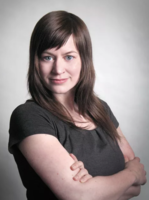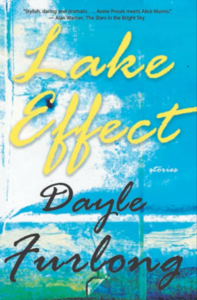"My Life Happened and Then the Stories Followed" Dayle Furlong on Writing Her Gritty, Gripping New Story Collection
The yearning hope and baffled rage of those characters who haven't been lucky in life is a palpable presence in Dayle Furlong's gritty new linked story collection, Lake Effect (Cormorant Books). With an atmosphere that wouldn't be out of place in a Springsteen song, the stories are wry, wise, and wistful, focused on regular people, struggling industries, and crumbling buildings.
Furlong's authenticity and empathy shine in each tale, all of which are set around the Great Lakes region, from Toronto and Chicago to small towns, ice fishing huts, prisons, and river banks. Deftly exploring larger social issues of class, power, access, and identity through the lens of the achingly, fearlessly personal, Lake Effect is an arresting collection from an insightful and powerful writer.
We're excited to speak to Dayle today about Lake Effect and her writing process. She tells us about what the characters in the stories have in common with one another and about finding a real life equivalent to one of her characters while on a family trip. And best of all, she shares an invite to her upcoming book launch (read on for details).
Open Book:
What do the stories have in common? Do you see a link between them, either structurally or thematically?
Dayle Furlong:
I wanted to write a short story cycle. I wanted each story to have a connection to the landscape and involve the great lakes. I’m quite fascinated by industry and how people make a living in their region. They all breed a culture and lifestyle. For instance, the cherry industry in Michigan, hydro-electric power in Niagara Falls and the pulp mills in Thunder Bay all require a certain skill set and attract certain people to work and settle in the respective areas. I’m preoccupied with people’s stories, struggles and often unnoticed, seemingly meaningless victories. I also wanted the characters’ similar experiences to refract as the reader progresses through the flow of the collection. For instance, in one story using drugs doesn’t work out at all whereas in another it’s not that big of a deal; family dynamics in one story is an example of edification and support yet in another there is a remoteness and a cruelty amongst members.
OB:
Do you think your characters have anything in common with each other, from story to story?
DF:
I think they are all searching for love. They are trying to understand why they aren’t loved or why things are so troubling, confusing, and wrong in their lives. There are several painters, addicts, divorced families, stepchildren, and people who are ashamed of themselves in the collection. Most of them are trying to come to terms with or improve their station in life.
OB:
Did you do any specific research for any of your stories? Tell us a bit about that process.
DF:
My life happened and then the stories followed. I’ve travelled through several of the towns and cities around the great lakes. Most of the stories come from conversations I’ve had with people about their lives. The results are aspects of my own and people’s lives filtered through the techniques of fiction. Some of the more specific stuff about the industries featured in the stories are researched.
OB:
What was the strangest or most memorable moment or experience during the writing process for you?
Your CanLit News
Subscribe to Open Book’s newsletter to get local book events, literary content, writing tips, and more in your inbox
DF:
I went to Michigan for Family Day one year to bring my daughter to an indoor waterpark. I was writing the story The Fresh Coast. I’d hoped to see an ice-fisher out on his sled. I did. It was more than I could have imagined. The way the sled looked. The expression on this guy’s face. He truly was the epitome of the man I wrote about. A boy abused by his father, who drank and smoked and struggled with love. A few years later I stayed with friends at a cottage on Lake Michigan owned by one of President Kennedy’s public policy advisors. He’d recently died, and I was given permission to snoop through his books. I found a book that confirmed a regional detail in the story. I stayed up all night reading another book and observing the lake imagining the fictional male character’s response. My American friend showed me the Saturday Night Live bit where Tina Fey gorged on sheet cake. It couldn’t have expressed the fictional character’s sentiments any better.
OB:
Did you celebrate finishing your final draft or any other milestones during the writing process? If so, how?
DF:
I wanted to have a big party. I booked the Great Lakes Brewery and bought a bunch of Lake Effect beer to give to guests. I hired Tony Dekker. Then the pandemic hit. Fortunately, everyone is available this time around, and we are having the launch at the brewery on Thursday, June 16th from 6:00pm-9:00pm with Tony Dekker doing a live acoustic set. Unfortunately, the Lake Effect beer has spoiled but there will be other kinds of beer available. I just want to eat, drink, listen to one of my favourite musicians and enjoy the company of friends I haven’t seen in ages due to the pandemic.
________________________________________
Dayle Furlong is a poet, novelist, and short story writer from Newfoundland. She studied Creative Writing at Humber College and Literature and Fine Arts at York University. Her novel, Saltwater Cowboys, was a Toronto Public Library Dewey Diva Pick and her poetry has been described as “reminiscent of seventies feminist-Atwood” by George Elliot Clarke. Furlong currently lives in Toronto.






